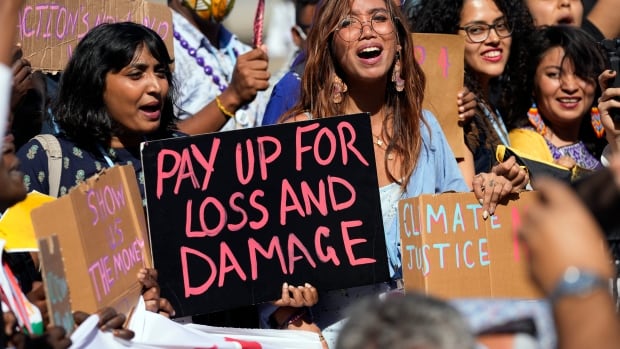It’s been nearly two weeks since Canada’s team of negotiators arrived in Sharm el-Sheikh, Egypt, for COP27, the UN climate change conference. Now, as delegates enter the final stretch of negotiations over various texts and communiques, what has Canada achieved during the conference?
This was dubbed the “African COP” and has become a forum for countries in the entire Global South — countries that have generally not been the largest historical emitters of greenhouse gases, but will bear the brunt of the climate crisis — to bring forward their demands.
Chief among them is funding for loss and damage — the unavoidable economic, cultural and human losses that countries will suffer as natural disasters wreak havoc on their communities and rising seas swallow up their coastlines.
Support for loss and damage, but no fund yet
Heading into COP27, Canada threw its support behind adding loss and damage to the official agenda of the conference — a big win for vulnerable countries who have been calling for funding for decades.
The Alliance of Small Island States, a group of low-lying and island countries, has proposed a multilateral fund organized under the UN climate change convention which would be established over the next year. But the announcement of such a fund has proven to be elusive.
Several wealthy countries made individual pledges for loss and damage, including Germany, Ireland, New Zealand and more. But the largest economy, the U.S., has been notably silent. U.S. President Joe Biden’s speech last week at COP27 did not mention loss and damage at all.
“Canada has to look at other progressive countries within the European Union, other countries like New Zealand, that are showing willingness to really respond to the calls of climate vulnerable nations,” said Eddy Pérez, international climate diplomacy manager at advocacy group Climate Action Network Canada.

Steven Guilbeault, Canada’s environment minister, said that he wants to see an agreement on loss and damage heading out of the conference.
“There is, I can imagine, frustration and great impatience on the part of the developing world because they’re been trying to have this conversation for 30 years. And countries like ours, and many other developed countries have refused to have that conversation,” Guilbeault said at a chat organized by Climate Action Network Canada at the conference venue in Sharm el-Sheikh.
“But that has changed this year.”
Canada joins Global Shield program
Canada did pledge money for another program that will address loss and damage. Global Shield, which is being led by Germany and was officially launched at this COP, will provide a form of insurance to vulnerable countries facing climate disasters.
Canada will provide $7 million to Global Shield, out of its pre-existing $5.3 billion climate finance commitment.
“We’re kickstarting here a response to loss and damage with that instrument. I think that is valuable,” said David Ryfisch, team leader for international climate policy at Germanwatch, a non-governmental climate research and advocacy group based in Germany.
“What is critical, however, is that this is just one element of a range of instruments we will have to see in terms of loss and damage.”
Ryfisch acknowledged that the approximately $200 million US that has been pledged to Global Shield, from Germany and countries around the world, was a drop in the bucket compared to the billions that will eventually be needed.
Global Shield is also focused on immediate recovery after disasters, not more slow-onset climate events or non-economic losses like the loss of human life.
“It cannot respond to all of the nuances of loss and damage,” Ryfisch said.
“But it’s a start.”

Though described as insurance, the program is aimed toward creating a pool of money from various donor countries that can be rapidly deployed after a climate disaster. The program will also help vulnerable countries pause their debt payments after a disaster so they can redeploy those funds to recovery.
Seven “pathfinder” countries have been chosen as the first recipients of the Global Shield program. They include countries like low-lying Bangladesh, island nations like the Philippines and Fiji, and notably Pakistan, which suffered devastating floods this year that inundated a third of its landmass.
The idea behind Global Shield is that insurance — unlike sometimes slow-moving humanitarian aid — can be dispersed quickly after a disaster. People and countries affected by climate events receive funding quickly to preserve their businesses and rebuild infrastructure, and can avoid falling into debt or losing their livelihoods in the immediate aftermath of disasters.
Getting closer to cutting methane
Canada also announced a framework for new methane regulations to reduce emissions of the potent greenhouse gas from the oil and gas industry.
Methane is about 80 times more potent than carbon dioxide and is responsible for a quarter of global warming seen until now. Tackling methane emissions is seen as essential for fighting climate change.
Canada’s goal, announced last year, is to reduce methane emissions by 75 per cent below 2012 levels by 2030. The new framework is now open for public consultations, and the draft regulations are expected next year.
Methane leaks from the various pieces of equipment and oil and gas sites, and reducing those leaks involves a combination of monitoring and fixing equipment, hunting for leaks and capturing the gas before it escapes.

Laying the groundwork for a biodiversity agreement
Closely following COP27, Canada will host the COP15 conference on the Convention on Biological Diversity in Montreal
This year’s conference is seen as a pivotal moment to gain a landmark agreement on protecting nature around the world, which is linked closely to reducing the impacts of climate change.
Steven Guilbeault, Canada’s environment minister, said that COP15 “must reach a deal as ambitious and comprehensive as the deal reached for climate in Paris,” referring to the 2015 Paris agreement to limit global warming to well below 2 C and ideally 1.5 C.
COP15 will run from Dec. 7-19.


